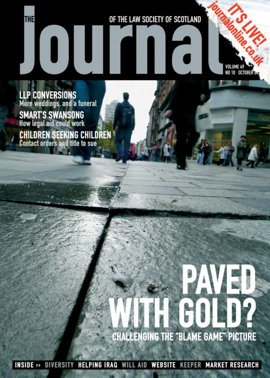Best medicine

On 31 October I demit office as Convener of the Law Society of Scotland’s Legal Aid Committee after a period of three and a half years. During that time I have worked with a group of fellow practitioners on the Legal Aid Committee whose efforts on behalf of the profession deserve much more recognition than they ever will receive. I have also worked with, and occasionally against, the Scottish Legal Aid Board and those at the Scottish Executive charged with the task of delivering access to justice in Scotland.
“Access to justice” has been the key phrase of that period. Initially I feared it was one of these meaningless New Labour phrases which promise much but deliver little. With time however I have concluded that is unfair. Each of the stakeholders does truly believe in delivering “access to justice”. It is simply that we all have different perceptions of that process.
I start at the top. Some occasionally forget that remuneration for legal aid lawyers is not set by SLAB but by the Scottish Executive. The Executive do so against the background of other competing claims on public expenditure. Legal aid will never win a popularity contest against spending on health, education or the emergency services. Apparently, some in the profession believe that if the Legal Aid Committee were to stand outside the Scottish Parliament, waving placards and shouting loudly, then a combination of public support and ministerial panic would extract immediate concessions from a suitably chastened political establishment. This needs only to be written down to be exposed for its absurdity. It is to the credit of the post-war welfare state that there is a recognition that rights which cannot be exercised, due to financial obstacles, are no rights at all. Even those in positions of power with the most hawkish anti-lawyer agenda seek only to encroach on the borders of that settlement. That should never be forgotten.
The Scottish Executive therefore genuinely believe in access to justice. BUT:
They are concerned about the price. Legal advice comes at a cost. The Executive know this from their experience as employers of the government legal service and the Crown Office and from what they pay for obtaining external legal opinion. To qualify as a lawyer requires a degree of academic achievement such that those who choose to go into the law do so in the knowledge that they can enjoy any number of lucrative career opportunities. Unsurprisingly, newly qualified lawyers are increasingly unwilling to practise in the legal aid field and those currently practising in that field are increasingly looking to get out. Even those who do not want to get out are inevitably getting older. We have told the Executive repeatedly that either the lawyers must be paid a proper rate for the job or the system will collapse and the Executive’s ambitions for access to justice will collapse with it. They can’t simply hope that “something will turn up”. It won’t.
The Executive must also admit to the consequences of their own actions. Inevitably, an increase in prosecutions impacts on the legal aid budget. So will the Vulnerable Witnesses Act, and in due course the Bonomy reforms. When that cost arises it is disingenuous for the Executive to let the lawyers take the blame.
Let’s then move on to the second stakeholder.
SLAB also genuinely believe in access to justice. BUT:
I was fortunate enough to arrive in office after the disastrous period during which SLAB and the profession were at war. It is to the credit of Jean Couper, the Chairman, and Lindsay Montgomery, the Chief Executive, that these days are a thing of the past. Legal advice is however provided by lawyers; it is only funded by SLAB. SLAB may be on the record in valuing the service provided by the profession, but they could surely go further in reducing the bureaucratic burden borne by we who do the actual delivery. It may indeed be the case that a small number of firms need to be kept an eye on. They are, however, a very small fraction of those providing the service. SLAB believe that. Surely they could make it a bit more obvious in their dealings with the rest of us.
And they should also have a more realistic view of the clients. It would be nice to think that they were always in fixed circumstances. In reality, clients are often in irregular circumstances or marginal employment. It may be easy for me, a professional person established in self employment to provide copies of my bank statements for the last six months, copies of my last two years’ trading accounts and payslips vouching my partner’s income. However, placed in the position of a victim of domestic violence, living in a women’s refuge, having lost my job as a cleaner as a consequence of my injuries, the verification demands of SLAB are sometimes wholly unrealistic. I am assured by them that if the full circumstances are explained, they will exercise a discretion to waive their own verification requirements but I’m by no means clear that is understood either by the clients or the profession, or that the practice always matches the intention. Certainly SLAB has an important obligation to ensure that public funds are properly disbursed, but they should not lose sight of their own fundamental objective, which is to ensure that those who would not otherwise be able to access the legal system can do so (with or without six months’ bank statements or five weeks’ payslips).
The legal profession also believe in access to justice. BUT:
At an early stage in my convenership, I stated that legal aid does not exist to provide remuneration for solicitors. I still believe that. Nonetheless it would be naive to pretend that legal aid does not provide significant remuneration to a section of the profession. As that section has become increasingly pressured financially, they have become increasingly defensive of the current regime. There is a fear of change, leading some to defend the indefensible where that indefensible brings with it certainty of at least limited financial reward. Whether it be one’s right to argue over every phrase in the most straightforward of prosecutions, to exhaust every possible ounce of correspondence that might be extracted from the 10 minute late return of a child from a contact visit, or to operate a befriending service for the criminal classes, too often some insist that “what we have we hold”. Where there is a real issue we deserve proper remuneration. We do ourselves no favours in seeking to preserve the funding where there is not. I know (believe me, I know) that there is a distrust of both SLAB and the Executive in making concessions. I know that the implied redistribution of funding which would arise from the “savings” from the fixed payment in summary criminal legal aid has not materialised. I also know however that no-one starting from scratch to devise a legal aid scheme for Scotland would devise one where two-thirds of the criminal budget went on summary offences or two-thirds of civil expenditure was directed at failed domestic relationships.
The profession, in one other respect, should not get off so lightly. We should be proud of what we do. The vast majority of legal aid lawyers do a first class job for their clients. While I have sympathy for the solicitors who resent quality assurance as an additional administrative burden, I have little comprehension of those who perceive that this process is likely to deprive them of their livelihood. They should have more confidence in themselves.
That leads me to my final but. It relates to the role of the Law Society of Scotland.
The Society also believes in access to justice. BUT:
As an apolitical organisation there are limitations to what the Society can achieve while we are left to argue, at least publicly, that every legal aid lawyer should be paid more for whatever area of publicly funded legal aid work they operate in. If we could find a way of setting our own priorities then I believe we would be considerably strengthened in our negotiations with the Executive.
We should also enjoy a greater realism from the profession in the resources we can commit to this work. The Society is run on subscriptions paid by its membership and 80% of that membership is paid not a penny from legal aid. For a significant part of the remainder such income as they do derive is but a marginal part of their annual turnover. Nonetheless the expectations of the legal aid practitioners, of whom I am one, are sometimes quite unrealistic in their calls on the Society’s time and resources. The Society maintains not only a major committee devoted to legal aid but employs significant staff resources both to service that committee and more generally to assist the profession. I take some credit for these resources having increased. There should however be some appreciation that the domestic conveyancers, commercial lawyers and in-house lawyers are entitled to some say over how their money is spent. There should also be some appreciation that, in the end, the Society does not make the Legal Aid Regulations, set the levels of payments or (much as we would like to) control the actions of SLAB. Just because something happens, or doesn’t happen, in each of these areas, this does not mean that we have somehow approved it.
For, finally, there is one area where the Society will inevitably always have its limitations. For us to engage in informed dialogue we require it to be conducted by practitioners. Full time officials at the Society, no matter how dedicated, cannot bring to the table experience of the actual day-to-day operation of the scheme. To be a practitioner however means that the time that one can devote to Society business is inevitably limited. I write this article against a background of outrage in certain sections of the profession as to the fact that they were not informed earlier of the intention of SLAB to publish each firm’s legal aid receipts on their website. I do not accept the argument that we could or should have done something to stop this. I do accept that the profession was entitled to more notice. On the other hand, in addition to my Law Society commitments, I had my own clients to attend to. In the end, there were only so many hours in a day.
I don’t know if I have been a success as the Convener of the Legal Aid Committee. That is for others to judge. I do know that I have tried my best on behalf of the profession and, more importantly, in my mind at least, on behalf of the client group. Goodbye and good luck. I’m away back to the law.
In this issue
- Citizenship, society and solicitors
- The well unfair state
- Litigation nation
- Best medicine
- Take a deep breath
- What title?
- Walk this way?
- Know your strategy
- e-quilibrium?
- The researchers
- Rights out of anarchy
- Political correctness or positive change?
- Steering clear
- How far can a board go?
- Major role for new tribunal
- The race is on (again)
- Planning a superhighway
- Website reviews
- Book reviews
- Single survey's lonely heart
- In harmony
- Clearing the path






